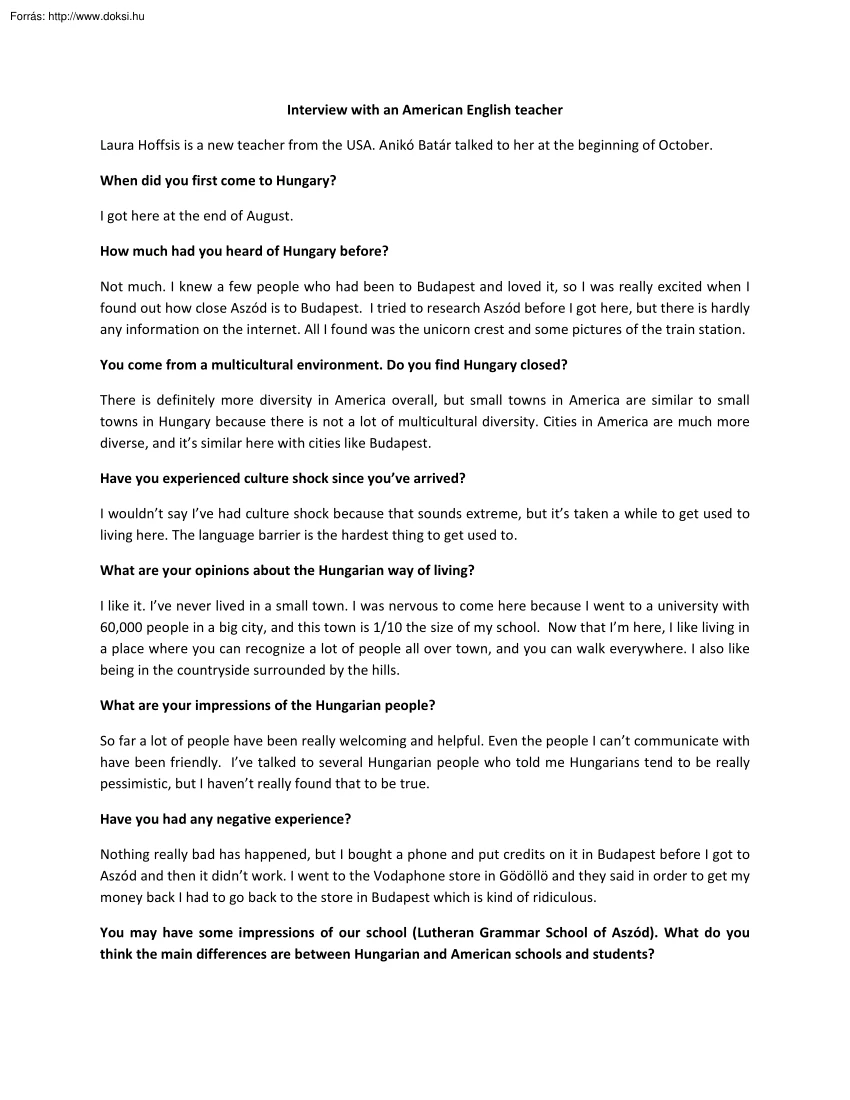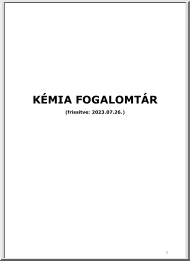A doksi online olvasásához kérlek jelentkezz be!

A doksi online olvasásához kérlek jelentkezz be!
Nincs még értékelés. Legyél Te az első!
Tartalmi kivonat
Interview with an American English teacher Laura Hoffsis is a new teacher from the USA. Anikó Batár talked to her at the beginning of October When did you first come to Hungary? I got here at the end of August. How much had you heard of Hungary before? Not much. I knew a few people who had been to Budapest and loved it, so I was really excited when I found out how close Aszód is to Budapest. I tried to research Aszód before I got here, but there is hardly any information on the internet. All I found was the unicorn crest and some pictures of the train station You come from a multicultural environment. Do you find Hungary closed? There is definitely more diversity in America overall, but small towns in America are similar to small towns in Hungary because there is not a lot of multicultural diversity. Cities in America are much more diverse, and it’s similar here with cities like Budapest. Have you experienced culture shock since you’ve arrived? I wouldn’t say I’ve had
culture shock because that sounds extreme, but it’s taken a while to get used to living here. The language barrier is the hardest thing to get used to What are your opinions about the Hungarian way of living? I like it. I’ve never lived in a small town I was nervous to come here because I went to a university with 60,000 people in a big city, and this town is 1/10 the size of my school. Now that I’m here, I like living in a place where you can recognize a lot of people all over town, and you can walk everywhere. I also like being in the countryside surrounded by the hills. What are your impressions of the Hungarian people? So far a lot of people have been really welcoming and helpful. Even the people I can’t communicate with have been friendly. I’ve talked to several Hungarian people who told me Hungarians tend to be really pessimistic, but I haven’t really found that to be true. Have you had any negative experience? Nothing really bad has happened, but I bought a phone and
put credits on it in Budapest before I got to Aszód and then it didn’t work. I went to the Vodaphone store in Gödöllö and they said in order to get my money back I had to go back to the store in Budapest which is kind of ridiculous. You may have some impressions of our school (Lutheran Grammar School of Aszód). What do you think the main differences are between Hungarian and American schools and students? Hungarian and American students are pretty similar. I think Hungarian students are a little bit more respectful to teachersthey stand when the teacher comes in the classroom and they wait for the teacher to dismiss them which is nice. The biggest difference between this high school and American high schools is the class structure. In Hungary students have a homeroom teacher and the same students in all of their classes for 3 or 4 years, and the students have their own classroom. In America the teachers have their own classrooms and the students have different people in each
of their classes. Students also have more of a say in which classes they take. Students are put into most core subjects like English, Math, and Science based on their level, and for the last two years of high school students can choose which history and science classes they take (chemistry, environmental science, anatomy, biology, etc. and US history, European history, world history, etc) There are also elective classes to choose from like art, photography, and ceramics, choir, orchestra, band, and extra gym classes. Also, there is more emphasis on standardized tests in Hungary. It seems like students are always preparing for a big English (or other subject) test they need to take, but in America we just take one or two tests with math, English, and writing sections in eleventh grade to get into college. Being late is another difference. In America there is no tolerance for being late, but that’s not emphasized as much in Hungary. There seem to be more small punishments in America
like detentions (staying after school for an hour) whereas in Hungary there seems to only be one punishment which is expulsion. Have you been asked many questions about your home country? I got a lot of questions the first week, mostly about American high schools and how they are different than this high school. I’ve gotten a few other random questions when different subjects come up in class. This is about what I expected What language difficulties do students have? I think their difficulties are mostly with listening and grammar. I know it’s a challenge for them to understand me sometimes, so I really have to work on slowing down and picking my words carefully, but I also think it’s good for them to get used to listening to me. With grammar, students mix up he/she and him/her a lot even though I know most of them know the difference. Present continuous vs present simple are also mixed up a lot at all levels which is understandable since most languages only have one present
tense. Can you communicate with many people? Not really. Luckily there are a lot of English teachers here, but it’s weird living in an environment where I can’t talk to most of the people. It worked out well last weekend when I went to the market on Saturday. I wanted to buy some potatoes, and when the older couple working at the stand realized I didn’t speak Hungarian, they thought it was funny and gave me the potatoes for free. What are your plans for the future? Next year I plan to go to grad school for international education. I want to work in an American university with international students. Have you started to learn Hungarian? I’ve listened to some audiotapes to learn a little Hungarian, and Eszter has offered to help me learn a little more. I really like how Hungarian sounds It’s completely different than other languages I’ve heard I was in the Czech Republic before this and their language is really harsh and guttural, so Hungarian sounds really soft and nice
compared to that. I’m starting to be able to find the word boundaries, but I can only understand a few words here and there. Laura Hoffsis, Anikó Batár
culture shock because that sounds extreme, but it’s taken a while to get used to living here. The language barrier is the hardest thing to get used to What are your opinions about the Hungarian way of living? I like it. I’ve never lived in a small town I was nervous to come here because I went to a university with 60,000 people in a big city, and this town is 1/10 the size of my school. Now that I’m here, I like living in a place where you can recognize a lot of people all over town, and you can walk everywhere. I also like being in the countryside surrounded by the hills. What are your impressions of the Hungarian people? So far a lot of people have been really welcoming and helpful. Even the people I can’t communicate with have been friendly. I’ve talked to several Hungarian people who told me Hungarians tend to be really pessimistic, but I haven’t really found that to be true. Have you had any negative experience? Nothing really bad has happened, but I bought a phone and
put credits on it in Budapest before I got to Aszód and then it didn’t work. I went to the Vodaphone store in Gödöllö and they said in order to get my money back I had to go back to the store in Budapest which is kind of ridiculous. You may have some impressions of our school (Lutheran Grammar School of Aszód). What do you think the main differences are between Hungarian and American schools and students? Hungarian and American students are pretty similar. I think Hungarian students are a little bit more respectful to teachersthey stand when the teacher comes in the classroom and they wait for the teacher to dismiss them which is nice. The biggest difference between this high school and American high schools is the class structure. In Hungary students have a homeroom teacher and the same students in all of their classes for 3 or 4 years, and the students have their own classroom. In America the teachers have their own classrooms and the students have different people in each
of their classes. Students also have more of a say in which classes they take. Students are put into most core subjects like English, Math, and Science based on their level, and for the last two years of high school students can choose which history and science classes they take (chemistry, environmental science, anatomy, biology, etc. and US history, European history, world history, etc) There are also elective classes to choose from like art, photography, and ceramics, choir, orchestra, band, and extra gym classes. Also, there is more emphasis on standardized tests in Hungary. It seems like students are always preparing for a big English (or other subject) test they need to take, but in America we just take one or two tests with math, English, and writing sections in eleventh grade to get into college. Being late is another difference. In America there is no tolerance for being late, but that’s not emphasized as much in Hungary. There seem to be more small punishments in America
like detentions (staying after school for an hour) whereas in Hungary there seems to only be one punishment which is expulsion. Have you been asked many questions about your home country? I got a lot of questions the first week, mostly about American high schools and how they are different than this high school. I’ve gotten a few other random questions when different subjects come up in class. This is about what I expected What language difficulties do students have? I think their difficulties are mostly with listening and grammar. I know it’s a challenge for them to understand me sometimes, so I really have to work on slowing down and picking my words carefully, but I also think it’s good for them to get used to listening to me. With grammar, students mix up he/she and him/her a lot even though I know most of them know the difference. Present continuous vs present simple are also mixed up a lot at all levels which is understandable since most languages only have one present
tense. Can you communicate with many people? Not really. Luckily there are a lot of English teachers here, but it’s weird living in an environment where I can’t talk to most of the people. It worked out well last weekend when I went to the market on Saturday. I wanted to buy some potatoes, and when the older couple working at the stand realized I didn’t speak Hungarian, they thought it was funny and gave me the potatoes for free. What are your plans for the future? Next year I plan to go to grad school for international education. I want to work in an American university with international students. Have you started to learn Hungarian? I’ve listened to some audiotapes to learn a little Hungarian, and Eszter has offered to help me learn a little more. I really like how Hungarian sounds It’s completely different than other languages I’ve heard I was in the Czech Republic before this and their language is really harsh and guttural, so Hungarian sounds really soft and nice
compared to that. I’m starting to be able to find the word boundaries, but I can only understand a few words here and there. Laura Hoffsis, Anikó Batár




 Útmutatónk teljes körűen bemutatja az angoltanulás minden fortélyát, elejétől a végéig, szinttől függetlenül. Ha elakadsz, ehhez az íráshoz bármikor fordulhatsz, biztosan segítségedre lesz. Egy a fontos: akarnod kell!
Útmutatónk teljes körűen bemutatja az angoltanulás minden fortélyát, elejétől a végéig, szinttől függetlenül. Ha elakadsz, ehhez az íráshoz bármikor fordulhatsz, biztosan segítségedre lesz. Egy a fontos: akarnod kell!